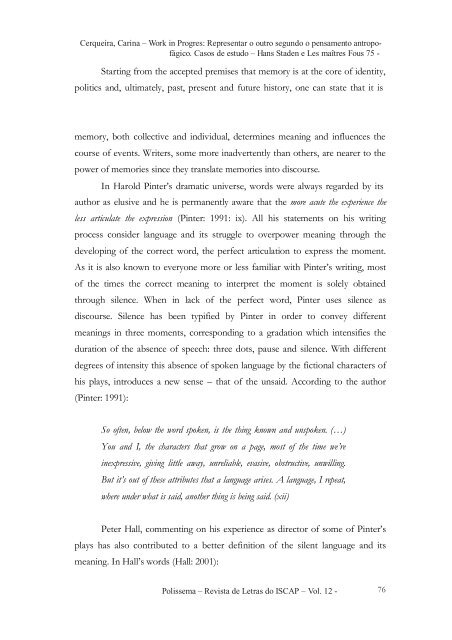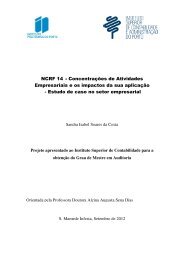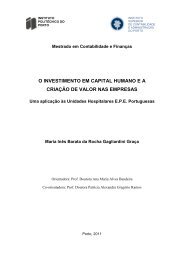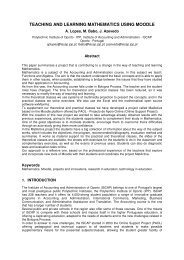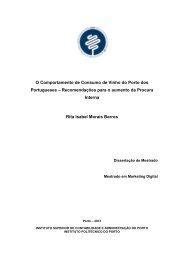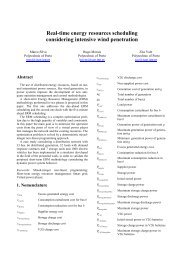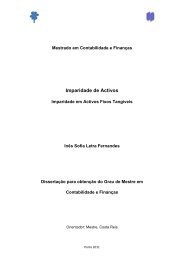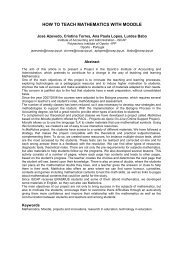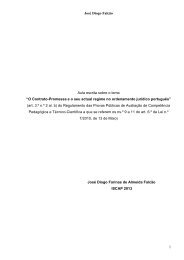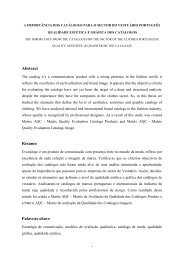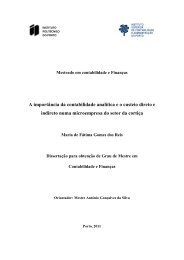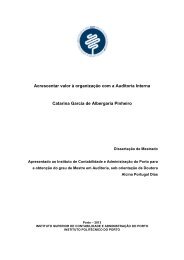- Page 3:
PolissemaRevista de Letras do Insti
- Page 6 and 7:
DETECTIVES WITH PIMPLES:HOW TEEN NO
- Page 8 and 9:
EDITORIALO número 12 da Revista PO
- Page 11 and 12:
LÍNGUA ADICIONAL: CONTEXTOS E CONT
- Page 13 and 14:
Neves, Ana Cristina - Língua adici
- Page 15 and 16:
Neves, Ana Cristina - Língua adici
- Page 17 and 18:
Neves, Ana Cristina - Língua adici
- Page 19 and 20:
Neves, Ana Cristina - Língua adici
- Page 21 and 22:
Neves, Ana Cristina - Língua adici
- Page 23 and 24:
Neves, Ana Cristina - Língua adici
- Page 25 and 26: Neves, Ana Cristina - Língua adici
- Page 27 and 28: A língua estrangeiraNeves, Ana Cri
- Page 29 and 30: Neves, Ana Cristina - Língua adici
- Page 31 and 32: Neves, Ana Cristina - Língua adici
- Page 33 and 34: Neves, Ana Cristina - Língua adici
- Page 35 and 36: Neves, Ana Cristina - Língua adici
- Page 37: Neves, Ana Cristina - Língua adici
- Page 40 and 41: Simões, Anabela Valente - Identity
- Page 42 and 43: Simões, Anabela Valente - Identity
- Page 44 and 45: Simões, Anabela Valente - Identity
- Page 46 and 47: Simões, Anabela Valente - Identity
- Page 48 and 49: Simões, Anabela Valente - Identity
- Page 50 and 51: Simões, Anabela Valente - Identity
- Page 52 and 53: Simões, Anabela Valente - Identity
- Page 54 and 55: Simões, Anabela Valente - Identity
- Page 57 and 58: WORK IN PROGRESS:REPRESENTAR O OUTR
- Page 60 and 61: Cerqueira, Carina - Work in Progres
- Page 62 and 63: Cerqueira, Carina - Work in Progres
- Page 64 and 65: Cerqueira, Carina - Work in Progres
- Page 66 and 67: Cerqueira, Carina - Work in Progres
- Page 68 and 69: Cerqueira, Carina - Work in Progres
- Page 70 and 71: Cerqueira, Carina - Work in Progres
- Page 72 and 73: Cerqueira, Carina - Work in Progres
- Page 74 and 75: Cerqueira, Carina - Work in Progres
- Page 78 and 79: Cerqueira, Carina - Work in Progres
- Page 80 and 81: Cerqueira, Carina - Work in Progres
- Page 82 and 83: Cerqueira, Carina - Work in Progres
- Page 84 and 85: Cerqueira, Carina - Work in Progres
- Page 86 and 87: Cerqueira, Carina - Work in Progres
- Page 88 and 89: Cerqueira, Carina - Work in Progres
- Page 90 and 91: Cerqueira, Carina - Work in Progres
- Page 92 and 93: Cerqueira, Carina - Work in Progres
- Page 94 and 95: Cerqueira, Carina - Work in Progres
- Page 96 and 97: Cerqueira, Carina - Work in Progres
- Page 99 and 100: ESPELHOS DA POBREZA E DA EXCLUSÃO
- Page 101 and 102: Gago, Dora Nunes - Espelhos da pobr
- Page 103 and 104: Gago, Dora Nunes - Espelhos da pobr
- Page 105 and 106: Gago, Dora Nunes - Espelhos da pobr
- Page 107 and 108: Gago, Dora Nunes - Espelhos da pobr
- Page 109 and 110: Gago, Dora Nunes - Espelhos da pobr
- Page 111 and 112: Gago, Dora Nunes - Espelhos da pobr
- Page 113 and 114: Gago, Dora Nunes - Espelhos da pobr
- Page 115 and 116: RESULTADOS PRELIMINARES DE UM ESTUD
- Page 117 and 118: Chorão, Graça Bigotte - Resultado
- Page 119 and 120: Chorão, Graça Bigotte - Resultado
- Page 121 and 122: Chorão, Graça Bigotte - Resultado
- Page 123 and 124: Chorão, Graça Bigotte - Resultado
- Page 125 and 126: Chorão, Graça Bigotte - Resultado
- Page 127:
Chorão, Graça Bigotte - Resultado
- Page 130 and 131:
Silva, Ivo Rafael - Orgulho e Preco
- Page 132 and 133:
Silva, Ivo Rafael - Orgulho e Preco
- Page 134 and 135:
Silva, Ivo Rafael - Orgulho e Preco
- Page 136 and 137:
Silva, Ivo Rafael - Orgulho e Preco
- Page 138 and 139:
Silva, Ivo Rafael - Orgulho e Preco
- Page 140 and 141:
Silva, Ivo Rafael - Orgulho e Preco
- Page 142 and 143:
Silva, Ivo Rafael - Orgulho e Preco
- Page 144 and 145:
Silva, Ivo Rafael - Orgulho e Preco
- Page 146 and 147:
Silva, Ivo Rafael - Orgulho e Preco
- Page 148 and 149:
Silva, Ivo Rafael - Orgulho e Preco
- Page 150 and 151:
Mancelos, João de - Detectives wit
- Page 152 and 153:
Mancelos, João de - Detectives wit
- Page 154 and 155:
Mancelos, João de - Detectives wit
- Page 156 and 157:
Mancelos, João de - Detectives wit
- Page 158 and 159:
Mancelos, João de - Detectives wit
- Page 160 and 161:
Mancelos, João de - Detectives wit
- Page 162 and 163:
Mancelos, João de - Detectives wit
- Page 164 and 165:
andMancelos, João de - Detectives
- Page 167 and 168:
LE MOMENT VENU OU L’ÉVEIL DES É
- Page 169 and 170:
Almeida, José Domingues de - Le mo
- Page 171 and 172:
Almeida, José Domingues de - Le mo
- Page 173 and 174:
Almeida, José Domingues de - Le mo
- Page 175 and 176:
Almeida, José Domingues de - Le mo
- Page 177 and 178:
Almeida, José Domingues de - Le mo
- Page 179:
Almeida, José Domingues de - Le mo
- Page 182 and 183:
Moner, Laia Manonelles - Migracion,
- Page 184 and 185:
Moner, Laia Manonelles - Migracion,
- Page 186 and 187:
Moner, Laia Manonelles - Migracion,
- Page 188 and 189:
Moner, Laia Manonelles - Migracion,
- Page 190 and 191:
Moner, Laia Manonelles - Migracion,
- Page 192 and 193:
Moner, Laia Manonelles - Migracion,
- Page 194 and 195:
Moner, Laia Manonelles - Migracion,
- Page 196 and 197:
Moner, Laia Manonelles - Migracion,
- Page 199 and 200:
L'HYPOCRISIE DANS DOM JUAN DE MOLI
- Page 201 and 202:
Pedrosa, Lúcia - L’hipocrisie da
- Page 203 and 204:
Pedrosa, Lúcia - L’hipocrisie da
- Page 205 and 206:
Pedrosa, Lúcia - L’hipocrisie da
- Page 207:
Pedrosa, Lúcia - L’hipocrisie da
- Page 210 and 211:
Cunha, Maria Clara - Dinâmica comu
- Page 212 and 213:
Cunha, Maria Clara - Dinâmica comu
- Page 214 and 215:
Cunha, Maria Clara - Dinâmica comu
- Page 216 and 217:
Cunha, Maria Clara - Dinâmica comu
- Page 218 and 219:
Cunha, Maria Clara - Dinâmica comu
- Page 220 and 221:
Cunha, Maria Clara - Dinâmica comu
- Page 222 and 223:
Cunha, Maria Clara - Dinâmica comu
- Page 224 and 225:
Cunha, Maria Clara - Dinâmica comu
- Page 227 and 228:
MUNDOS DENTRO DE UM MUNDO:REPRESENT
- Page 229 and 230:
Andrade, Nuno Neves - Mundos dentro
- Page 231 and 232:
Andrade, Nuno Neves - Mundos dentro
- Page 233 and 234:
Andrade, Nuno Neves - Mundos dentro
- Page 235 and 236:
Andrade, Nuno Neves - Mundos dentro
- Page 237 and 238:
Andrade, Nuno Neves - Mundos dentro
- Page 239 and 240:
Andrade, Nuno Neves - Mundos dentro
- Page 241 and 242:
Andrade, Nuno Neves - Mundos dentro
- Page 243 and 244:
Andrade, Nuno Neves - Mundos dentro
- Page 245 and 246:
Andrade, Nuno Neves - Mundos dentro
- Page 247 and 248:
Andrade, Nuno Neves - Mundos dentro
- Page 249 and 250:
Andrade, Nuno Neves - Mundos dentro
- Page 251 and 252:
Andrade, Nuno Neves - Mundos dentro
- Page 253 and 254:
Andrade, Nuno Neves - Mundos dentro
- Page 255 and 256:
A PERFORMANCE E O DESFAZIMENTO DOLO
- Page 257 and 258:
Frey, Tales - A performance e o des
- Page 259 and 260:
Frey, Tales - A performance e o des
- Page 261 and 262:
Frey, Tales - A performance e o des
- Page 263 and 264:
Frey, Tales - A performance e o des
- Page 265 and 266:
Frey, Tales - A performance e o des
- Page 267 and 268:
Frey, Tales - A performance e o des
- Page 269 and 270:
Frey, Tales - A performance e o des
- Page 271 and 272:
Frey, Tales - A performance e o des
- Page 273 and 274:
Frey, Tales - A performance e o des
- Page 275:
Frey, Tales - A performance e o des
- Page 278 and 279:
Fernandes, Verónica Daminelli - (I
- Page 280 and 281:
Fernandes, Verónica Daminelli - (I
- Page 282 and 283:
Fernandes, Verónica Daminelli - (I
- Page 284 and 285:
Fernandes, Verónica Daminelli - (I
- Page 286 and 287:
Fernandes, Verónica Daminelli - (I
- Page 288 and 289:
Fernandes, Verónica Daminelli - (I
- Page 290 and 291:
Fernandes, Verónica Daminelli - (I
- Page 292 and 293:
Fernandes, Verónica Daminelli - (I
- Page 295:
Traduções
- Page 298 and 299:
Kuksenkov, Daniil, Ustimenko, Maria
- Page 300 and 301:
Kuksenkov, Daniil, Ustimenko, Maria
- Page 302 and 303:
Kuksenkov, Daniil, Ustimenko, Maria
- Page 304 and 305:
Kuksenkov, Daniil, Ustimenko, Maria
- Page 306 and 307:
Kuksenkov, Daniil, Ustimenko, Maria
- Page 309:
Recensões
- Page 312 and 313:
Cerqueira, Carina - Literary texts
- Page 314 and 315:
Cerqueira, Carina - Literary texts
- Page 316 and 317:
Moura, Micaela da Silva Marques - O
- Page 318 and 319:
NORMAS PARA CITAÇÕES Para citar n
- Page 320:
Examples: The author says that "the


